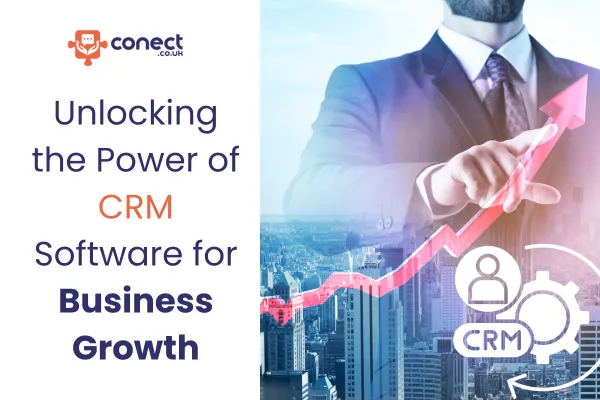
Unlocking the Power of CRM Software for Better Sales
Unlocking the Power of CRM Software for Business Growth
Unlocking the power of CRM software can completely transform how businesses manage customer relationships, sales, and marketing efforts. Customer Relationship Management (CRM) software is no longer just a tool for large enterprises—it has become a necessity for businesses of all sizes. With the ability to store and analyze customer data, automate marketing and sales tasks, and provide detailed insights, CRM software helps companies streamline operations and improve efficiency.
As competition in the marketplace increases, businesses need to focus on delivering personalized experiences to customers. A CRM system enables companies to maintain detailed records of interactions, preferences, and transaction histories. This allows businesses to engage with customers more effectively, build stronger relationships, and ultimately drive more revenue.
This blog explores how businesses can unlock the power of CRM software, covering its essential features, benefits, challenges, and best practices to maximize its potential.
Why CRM Software is Essential for Modern Businesses
Many businesses still rely on outdated methods such as spreadsheets or disconnected tools to manage customer relationships. These methods often result in data silos, missed opportunities, and inefficient processes. CRM software solves these problems by centralizing customer information and providing actionable insights.
Key Benefits of CRM Software
1. Centralized Customer Data
CRM software acts as a single source of truth for all customer interactions. It stores contact details, purchase history, communication logs, and customer preferences in one location. This eliminates the need for scattered data across multiple platforms, making it easier for teams to access and update records.
2. Improved Sales Process
A well-implemented CRM system provides sales teams with a structured approach to managing leads and closing deals. With features like lead scoring, automated follow-ups, and pipeline tracking, sales representatives can prioritize high-value prospects and nurture them effectively.
3. Enhanced Customer Experience
Personalization is a key factor in customer retention. CRM software helps businesses tailor their communication based on customer behavior and preferences. Automated reminders, targeted promotions, and personalized emails improve customer engagement and satisfaction.
4. Better Team Collaboration
CRM software allows different departments—sales, marketing, and customer service—to work together seamlessly. A shared database ensures that everyone has access to the same customer information, reducing miscommunication and improving response times.
5. Increased Productivity Through Automation
Repetitive tasks such as data entry, email follow-ups, and report generation can be time-consuming. CRM software automates these tasks, freeing up employees to focus on high-value activities like closing sales and building relationships.
Key Features That Unlock the Power of CRM Software
1. Lead Management and Tracking
Generating leads is only the first step. The real challenge lies in nurturing those leads and converting them into customers. CRM software provides tools to track leads through different stages of the sales funnel, ensuring that no potential opportunity is lost.
2. Workflow Automation
Businesses can automate processes such as sending welcome emails, scheduling follow-ups, and assigning tasks. Automation reduces human errors and ensures consistency in customer interactions.
3. Advanced Analytics and Reporting
CRM software offers detailed insights into customer behavior, sales trends, and marketing campaign performance. Businesses can use these insights to refine their strategies and improve decision-making.
4. Multi-Channel Communication
Modern CRM systems integrate with various communication channels, including email, social media, and live chat. This allows businesses to engage with customers through their preferred platforms, increasing responsiveness and engagement.
5. Integration with Other Business Tools
A CRM system works best when integrated with other essential tools such as email marketing platforms, accounting software, and customer support systems. This seamless connectivity improves efficiency and prevents data silos.
How CRM Software Drives Business Growth
1. Increases Sales and Revenue
A CRM system provides sales teams with real-time data on leads and opportunities. With automated follow-ups and lead scoring, businesses can focus on the most promising prospects, leading to higher conversion rates and increased revenue.
2. Build Up Customer Retention
Customer retention is just as important as acquiring new customers. CRM software helps businesses build long-term relationships through personalized interactions, loyalty programs, and proactive customer service. Satisfied customers are more likely to return and refer others.
3. Enhances Productivity and Efficiency
By automating administrative tasks, CRM software allows employees to concentrate on core business functions. Teams can manage their workload more efficiently, leading to faster response times and improved customer satisfaction.
4. Enables Data-Driven Decision Making
Businesses that rely on guesswork risk making costly mistakes. CRM software provides real-time insights into customer preferences, buying patterns, and market trends. This data-driven approach helps companies make informed decisions and optimize their strategies.
Common Challenges and How to Overcome Them
1. Resistance to Adoption
Some employees may be reluctant to use CRM software due to a lack of familiarity or fear of change. To address this, businesses should provide proper training, demonstrate the software's benefits, and encourage gradual adoption.
2. Data Management Issues
A poorly maintained CRM system can lead to duplicate or inaccurate data. Regular data cleansing and validation ensure that customer records remain accurate and up to date.
3. Integration Complexity
Choosing a CRM that integrates seamlessly with existing tools can prevent workflow disruptions. Businesses should assess their current software ecosystem before selecting a CRM solution.
4. Cost Concerns
While CRM software can be a significant investment, the long-term benefits far outweigh the costs. Businesses should consider the return on investment in terms of increased efficiency, higher sales, and improved customer retention.
Best Practices for Maximizing the Power of CRM Software
Customize the CRM to Fit Business Needs: Not all CRM systems are one-size-fits-all. Businesses should configure their CRM to align with their specific workflows and objectives.
Encourage Team Collaboration: A CRM is most effective when used by all relevant departments. Encouraging collaboration ensures that customer interactions are seamless and well-documented.
Use Automation to Save Time: Automating repetitive tasks allows teams to focus on strategic activities that drive business growth.
Regularly Analyze CRM Data: Businesses should leverage CRM analytics to identify trends, measure performance, and refine their sales and marketing strategies.
Provide Ongoing Training: CRM software evolves over time, and employees need to stay updated with new features and best practices. Regular training sessions help maximize the software’s potential.
How to Choose the Right CRM Software for Your Business
Selecting the right CRM software depends on your business size, industry, and specific needs. Look for a system that offers scalability, user-friendly navigation, and integration with existing tools. Consider cloud-based options for flexibility and remote access. Evaluate features like automation, reporting, and customization to ensure the CRM aligns with your business goals. Reading user reviews and opting for a free trial can also help determine if the software meets your requirements before making a long-term investment.
Conclusion
Unlocking the power of CRM software is essential for businesses aiming to improve customer relationships, streamline sales processes, and drive growth. A well-implemented CRM system enables companies to automate workflows, gain valuable customer insights, and enhance collaboration among teams.
By leveraging CRM software effectively, businesses can increase sales, strengthen customer retention, and improve overall productivity. Investing in a powerful CRM solution is not just a smart business decision—it is a necessity for staying competitive in today’s fast-paced market. Companies that fail to adopt CRM technology risk falling behind, while those that embrace it will unlock new opportunities for long-term success.
FAQs
1. What is CRM software used for?
CRM software helps businesses manage customer interactions, streamline sales, and improve customer relationships through automation and data analysis.
2. How does CRM software improve sales?
It organizes leads, tracks customer interactions, and automates follow-ups, helping sales teams close deals faster and more efficiently.
3. Can small businesses benefit from CRM software?
Yes, small businesses can use it to manage customer data, automate tasks, and improve communication without needing a large sales team.
4. What are the key features of a good CRM system?
Essential features include contact management, sales tracking, automation, reporting, and integration with other business tools.
5. How does CRM software enhance customer retention?
By tracking customer interactions and preferences, businesses can offer personalized experiences, improving customer satisfaction and loyalty.
6. Is CRM software difficult to implement?
Implementation depends on the system, but most modern CRMs offer user-friendly interfaces, training, and support for easy adoption.
7. Can CRM software integrate with other business tools?
Yes, most CRM systems integrate with email marketing, accounting, and customer support tools for seamless business operations.
8. How does automation in CRM software save time?
It reduces manual tasks like data entry, follow-ups, and reporting, allowing employees to focus on strategic activities.
9. What are the common challenges in using CRM software?
Challenges include user resistance, data management issues, integration complexities, and ensuring proper usage across teams.
10. How can businesses maximize the benefits of CRM software?
By customizing workflows, automating tasks, training employees, and regularly analyzing data to refine sales and marketing strategies.

The All-In-One Solution to grow your business. Capture Free Leads And Conversationally Covert Them Into Customers!
Contact information
Address : Layton Lane, Rawdon, Leeds, LS19 6RG
Phone : +44 7859 775480
Email : [email protected]
© 2025 Butterfly Effect Marketing Ltd - All Rights Reserved.

